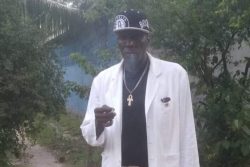Dear Editor,
I am counted among the many who long for the Rodney Inquiry to be called up and done with so that we can have closure. It will be the icing on the cake, finally cementing what many long knew so well, though no doubt there are likely to be some new revelations and surprises.
A few weeks ago I penned a letter that went under the caption ‘It doesn’t hurt to be honest,’ and I really think that at least we should all try to be. Now why is it that we are still banging our heads against a wall in total denial that the PNC regime under the leadership of Forbes Burnham had something to do with Walter Rodney’s death?
I wasn’t at the recent death anniversary in honour of the late President Burnham in Linden which was held at the Egbert Benjamin Exhibition Centre, when my friend Jonathan Adams made his presentation, but I was informed by RDC Councillor Stanley Humphrey about what transpired. I have confidence in Mr Humphrey; I do not know him to be a bearer of falsehood. As I was told by other participants, apart from Mr Humphrey, Jonathan Adams’ presentation on Burnham and his policies was excellent and about that I have no comment. I take issue with him on his take on Rodney’s death and the Burnham scenario that Rodney set up his own demise, which I find odious, preposterous and off kilter. Adams’ piercing focus on students in attendance in dealing with this matter was intended to impress, and instilled in their minds that Burnham wasn’t guilty of anything about Rodney’s death. He said it was Rodney who threatened Burnham, an astute statesman who stood up against former colonial masters and was not one to mess with; that Rodney/WPA were accumulating weapons, but the crafty Burnham made the timely move and drew first blood ‒ taking him out. What Mr Adams was saying and even boasting about was that Rodney, one of Guyana and the Caribbean’s foremost intellectuals and historians deserved to die simply because he had the audacity to challenge Forbes Burnham. Challenge for Mr Adams is synonymous with death. But boasting that Burnham got the better of Rodney is in itself an admission of the “astute and crafty warrior’s” guilt; it convicts him, which by the way would make any further inquiry a waste of time, no?
Look, I concede that at some point we have to bury the hatchet, and as Phillip Bynoe would say, in the ground and not in each other’s head; let the dead past remain where it belongs except for those rich, glorious and positive events or periods which can be held up as a banner for inspiration, hope and forward movement as one people, one destiny.
But still, if we must harp on it, it is better if we get it right or let it be ‒ rest. Professor Ali Mazrui of Tanzania, here some years ago and touching on the Rodney issue talked about the healing of a nation; the need to get to the depth of things so as to know and understand what took place, the truth, then picking ourselves up and moving on.
Most Guyanese I’m sure would agree that our two foremost leaders, Burnham and Jagan, who fought colonialism were heroes in their own right; they championed the cause of their people, most forcefully at some point in time. However, we can acknowledge that they both made mistakes, blunders ‒ after all they were both mortals and not immune from human failings; public servants not perfect servants; men who possessed good qualities but not God. I recall Forbes Burnham haranguing his critics saying something to the effect with all force of authority and fullness of power: “No one in heaven or earth will tell me how to run this country, if yuh all want yuh can vote me out, I aint kay.” But some time later at another rally he admitted, “We made a mistake in scrapping the railway.”
The question is how do we exploit the good they did and build on it. It is clear that we cannot do so by deceit, wittingly or unwittingly, thus as Ché Guevera was wont to say, we need to be careful about what we are not sure about and tread cautiously.
A crooked and twisted history may not be our best guiding light ever. We who want to sing the praises of those we consider heroes need to be magnanimous and avoid the creepy things which can prevent us moving forward as a mature people; exploit only the good parts of the legacy. We must be mindful of the things we are trying to impart to the young if we desire them to be righteous, mentally strong and forceful, have moral rectitude and be respecters of truth and not falsehood.
Look, that someone of the calibre of Rodney, a black man was “taken out” ought not to be seen as a victory for anyone ‒ no glee ‒ but rather a tragedy and a great loss not only to Africans and Guyana, but to the Caribbean and the world. And it matters not how Rodney is viewed by some here at home, there is one incontestable truth that no one here or elsewhere could deny: trying to make him look diminished, discredited simply because he fell victim to one much more scheming will not erase or reduce his stature.
Let us be careful about the picture and image we are trying to create.
In any event none of the present crop of politicians from other parties can be compared to him; just look at what is happening right now, everyone is on the hustle train. Politicians are tearing each other apart, just to get a chance to do the exact same things. Our political leaders are plenty short on morality, but still I cannot figure out how in honouring one black brother and castigating another good one helps.
Editor, I take note that Mr Adams has perceived that period of our struggle to be a battle between Burnham versus Rodney, but his interpretation is not state-of-the-art stuff. However, let me recall one occurrence: When Burnham at a PNC rally made fun of WPA activists scattering when thugs descended upon them sharing blows like rain, he then let out guttural laughter after telling of how Rodney ran and jumped a high fence in Campbellville: “Comrades we have to send him to Olympics,” he said. He wasn’t playing; it was kind of bloodcurdling laughter with a menacing undertone.
And what if Rodney called him “King Kong”? Burnham called the United Force useless fellows; the WPA the worst possible alternative and those who opposed the referendum, rats. Hey! but that name ‘King Kong’ did get under his skin.
Now history is replete with great leaders who craved power so much that they wouldn’t live without it, so much so that nothing is so sacred, so feared that it cannot be obliterated. And they have gotten rid of many equally great men they feared so much.
But it would be much more interesting having this Burnham, Rodney part of Adam’s talk published.
Most likely if it were, it would sure get some agitated responses, including from Professor Horace Campbell, one time chairman of the Pan African Organisation, who saw Rodney as a genuine Pan Africanist and spoke from the standpoint of a black man and not a Jamaican, but whom Adams blames as the culprit for wanting to deny Burnham what he truly deserves.
En passant, it seems as if we will soon have to recognise two fathers of this nation: one for the Indians and one for Africans, Lord! when and where will it end?
Yours faithfully,
Frank Fyffe





